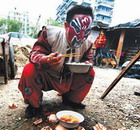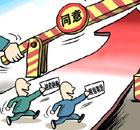Foreign and Military Affairs
Obama meets Dalai Lama
By Tan Yingzi (chinadaily.com.cn)
Updated: 2010-02-19 11:17
 |
Large Medium Small |
WASHINGTON: President Barack Obama's meeting with the Dalai Lama on Thursday is making the Sino-US relationship more worrisome amid a series of unhappy incidents between the two sides recently, experts said.
Despite the firm and repeated opposition from Chinese government, President Obama had a 70-minute private meeting with the Dalai Lama in the White House's Map Room. Later in the afternoon, the State Secretary Hillary Clinton also held a talk with the Dalai Lama.
| ||||
"What is far more worrisome (than the meeting with the Dalai Lama) is the overall trend in Sino-American relations," Dean Cheng, Research Fellow of Asian Studies Center with The Heritage Foundation, told China Daily.
The visit of the Dalai Lama occurs in the midst of a series of individual incidents, including the Google-China imbroglio, Secretary of State Clinton's speech on Internet freedom, the announcement of arms sales to Taiwan, and the release of the QDR (Quadrennial Defense Report), which identifies China as a nation the US still must hedge against, he said.
"Coupling these with economic tensions, including threats of imposing tariffs, and you have a series of issues that, in combination, make it look like the United States is intent on pursuing a much harder line against China," he said.
Charles W. Freeman III, who holds the Freeman Chair in China Studies at the Center for Strategic and International Studies in Washington, DC, also noticed that the Obama Administration is getting tough on China and the changed tone and tense Sino-US relations "set the perfect stage" for the president to meet with the Dalai Lama.
"In particular, with the president's State of the Union Address in January, where he emphasized the importance of job creation and exports in the US economic recovery, Obama has publicly claimed that he will get tougher on China over its US trade surplus," he told China Daily.
But he said the biggest concern now between the two countries is how China will work with the US on the Iran issue.
"What is special about this meeting is that Chinese public has pinned too much expectation on Obama and then got disappointed," Li Cheng, director of research at John L. Thornton China Center under The Brookings Institution, told China Daily.
Last year, President Obama postponed the meeting with the Dalai Lama before his first trip to China despite the strong domestic criticism. During the joint press conference with President Hu Jintao in Beijing, Obama also recognized that Tibet is part of China and the US will not intervene in China's domestic affairs by supporting the Chinese government and the representatives of the Dalai Lama to resolve the problem through dialogue.
But facing the increasing pressure from the Congress and some human rights groups, the Obama Administration has to make some change and tries not to be "soft" towards China, Li said.
"Though a lot of progress has been achieved in the Sino-US relations last year, it has not yet seen any fundamental changes. There is still a long way to go before the two countries forge a true partnership," Li said.
Hours after the meetings with the Dalai Lama, Chinese Foreign Ministry spokesman Ma Zhaoxu issued a statement urging the US government to take immediate measures to wipe out the baneful impact of the meeting and stop conniving and supporting anti-China separatist forces that seek "Tibet independence".
"The US act grossly violated the norms governing the international relations, and ran counter to the principles set forth in the three China-US joint communiqués and the China-US joint statement," he said.
It also went against the repeated commitments by the US government that the US recognizes Tibet as part of China and gives no support to "Tibet independence," he said.
The US should stop interfering in China's internal affairs and make concrete actions to maintain healthy and steady growth of China-US relations, he added.
"The reason behind our opposition is what Dalai has said and done in the past decades have shown that he is absolutely not a pure religious figure, but a politician in exile who's long engaged in activities to split China and undermine ethnic unity in China under the cover of religion," said?Wang Baodong, spokesman of the Chinese Embassy in the US.
The spokesman said, while claiming that his visits to foreign countries are aimed at spreading religious teachings, he has never stopped defaming the Chinese Government, selling "Tibet independence" proposals and undermining relations between China and other countries. The talks between Dalai's private representatives and the Chinese Central Government at the end of January have demonstrated that the Dalai group is still clinging to their separatist propositions, including the so-called "greater Tibet region" and "true autonomy", whose ultimate goal is to separate a quarter of Chinese territory from China. This is absolutely unacceptable to the Chinese Government and people.
"We also hope American people of various walks of life see through Dalai Lama's true nature as a separatist and his ulterior motive of sabotaging China-US relations by making visits to this country, understand and support China's just positions on Tibet-related issues," he said.
According to the CNN/Opinion Research Corp. survey released on Thursday, most of the Americans think it is more important to maintain good relations with China than to take a stand on Tibet.
Neither China nor the United States can afford strained relations, said Douglas Paal, a diplomat and investment banker who has been a presidential adviser on China, during an interview with CNN.
"We both need each other," Paal said. "We need each other for a number of international security issues -- to deal with the global climate crisis, to deal with the global financial crisis."
China is the largest growing export market for US companies, Paal said, expanding by 65 percent last year alone.
"We have a very comprehensive relationship with China, and it encompasses many different issues. We will continue to have disagreements. That's the way it is between any two countries, particularly two with such complex global interests and relationships as we have," US Secretary of State Hillary Clinton said during her interview with Bloomberg on Tuesday.











